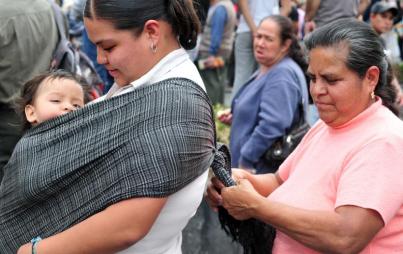
Since when has "just don't get pregnant" been an effective promotion of reproductive health?
Liberalizing abortion legislation as a temporary measure is not enough to address the longstanding issue.
Use insect repellent, sleep under a mosquito net, and just don’t get pregnant — is this the best we can do for Latin American women?
On Monday, the World Health Organization declared that the outbreak of the Zika virus constitutes a global emergency. This, after an outbreak was linked to a birth defect called Guillain-Barré syndrome, which prompted the Salvadoran government to began recommending women refrain from getting pregnant until 2018.
Besides El Salvador, 20 other countries and territories in South and Central America and the Caribbean have been affected including Haiti, Honduras, Mexico, Venezuela, and Puerto Rico. Just this weekend, the New York Times announced that there are over 20,000 confirmed cases of the Zika virus in Colombia, and over 2,100 of those infected are pregnant.
The fact is, the state of women’s health in these affected areas has long constituted the need for international concern. Since news of the crisis in El Salvador was first announced, journalists and human rights workers have been putting Zika into cultural and political context, with numerous outlets commenting on El Salvador’s utter lack of women’s reproductive rights.
We’re talking about an overwhelmingly conservative society where there's a total lack of sex education beyond abstinence, where contraception and birth control is difficult to obtain and where abortion is illegal, even in the cases of incest or rape. In the last year, at least 17 women have been imprisoned for having miscarriages, and countless more for having abortions, a fact that prompted the Guardian to describe El Salvador as having “the most draconian anti-abortion law[s] in the world.”
Social media is being used to disseminate information about the crisis— the UN and WHO are tweeting FAQ, for example— but perhaps more importantly, affected women and their allies are using traditional and social media to articulate these broader concerns, push back and call people to action.
On Twitter, people are criticizing how the warnings are aimed at women, and not men, and how it’s all yet another example of women being told to control what systems of oppression have made us uncontrollable. Carmen Barroso, Western Hemisphere director for the International Planned Parenthood Federation, described the way the involved governments are handling the crisis as “foolish, highly unrealistic and insensitive to women,” She’s one of many arguing for governments to make contraceptives more accessible. So is Angelica Rivas, who works for Acdatee, a Salvadoran nonprofit that advocates for decriminalization of abortion. Rivas expressed her concern to the Associated Press that the virus will result in an increase in the rates of illegal abortions, unsafe abortions, and mental health issues for women. Paula Avila Guillen — another long-time activist on the issue — shared similar concerns on Huffington Post, demanding policies to make contraception and emergency contraception available. Avila Guillen described the crisis as “a huge opportunity for the anti-abortion law to be reformed.”
Besides strict anti-abortion legislation, experts say that religious and cultural stigma, as well as physical distance and lack of sex education, creates barriers to women’s health resources. These barriers are experienced more acutely by young people, poor people, and people living in rural areas.
Human rights advocate Tarah Demant spoke of a concern that gender-based violence is prevalent in many parts of South America and that poor, rural, and indigenous girls and women — who are more likely to experience sexual violence — are also less likely to have access to contraceptives.
Just last week we marked the 43rd anniversary of Roe v. Wade, providing an opportunity for those of us in the US to take stock of the state of our own reproductive freedoms.
Whereas the “pro-life” movement is still responsible for constant infringements on women’s bodily autonomy and violence against clinic providers remains a daily threat, we’re working hard as a movement to dismantle societal misconceptions and problematic beliefs. I count myself among a movement of women directly confronting the notion that an abortion is something to keep silent or regret.
Rosa Hernandez, the El Salvador director of Catholics for Choice, is a voice in a similar movement. Catholics for Choice promotes the idea that women should be trusted to make their own decisions based on their conscience. Above all, they raise awareness of the fact that abortion bans result in women’s deaths.
A report by the Independent says that women’s rights organizations are urging governments to relax their abortion laws so that women with Zika can terminate the pregnancy (so far, they said, these calls have only been met by the Colombian government). And at least one private charity called Women on Waves has stepped up to provide free medical abortions to pregnant women with Zika.
These actions help. But just as it’s not enough to fumigate or tell women to wear long sleeves, liberalizing abortion legislation as a temporary measure is not enough to address the longstanding issue.
The lack of women’s reproductive rights has long been a crisis for Latin American women. It’s time the international community take notice.







